Emanoc怎样提高英语六级听力词汇量
- 格式:doc
- 大小:52.50 KB
- 文档页数:9
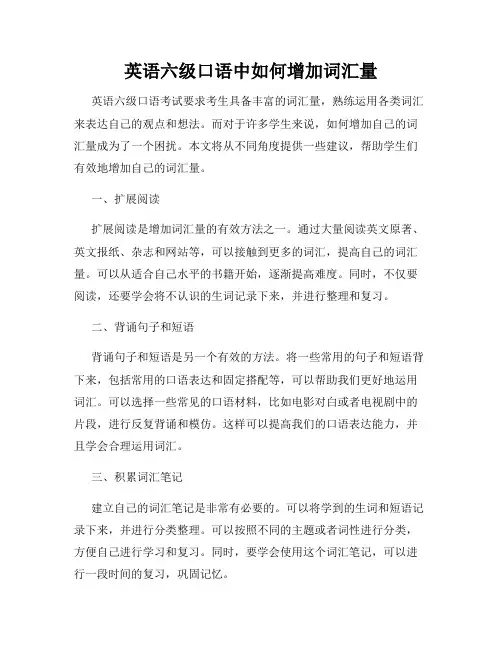
英语六级口语中如何增加词汇量英语六级口语考试要求考生具备丰富的词汇量,熟练运用各类词汇来表达自己的观点和想法。
而对于许多学生来说,如何增加自己的词汇量成为了一个困扰。
本文将从不同角度提供一些建议,帮助学生们有效地增加自己的词汇量。
一、扩展阅读扩展阅读是增加词汇量的有效方法之一。
通过大量阅读英文原著、英文报纸、杂志和网站等,可以接触到更多的词汇,提高自己的词汇量。
可以从适合自己水平的书籍开始,逐渐提高难度。
同时,不仅要阅读,还要学会将不认识的生词记录下来,并进行整理和复习。
二、背诵句子和短语背诵句子和短语是另一个有效的方法。
将一些常用的句子和短语背下来,包括常用的口语表达和固定搭配等,可以帮助我们更好地运用词汇。
可以选择一些常见的口语材料,比如电影对白或者电视剧中的片段,进行反复背诵和模仿。
这样可以提高我们的口语表达能力,并且学会合理运用词汇。
三、积累词汇笔记建立自己的词汇笔记是非常有必要的。
可以将学到的生词和短语记录下来,并进行分类整理。
可以按照不同的主题或者词性进行分类,方便自己进行学习和复习。
同时,要学会使用这个词汇笔记,可以进行一段时间的复习,巩固记忆。
四、参加口语角色扮演参加口语角色扮演活动可以帮助我们更好地应用词汇。
可以和其他学习者一起组队或者参加英语角,进行情境对话和提问。
这样可以更加自然地使用所学的词汇,增强记忆和应用能力。
五、利用互联网资源互联网是一个非常丰富的资源库,有许多在线学习平台可以帮助我们增加词汇量。
可以选择一些专门的英语学习网站或者应用程序,通过学习词汇的游戏、测试和练习等,提高自己的词汇量。
同时,还可以利用在线词典和翻译工具来查询词义和用法。
总结起来,扩展阅读、背诵句子和短语、积累词汇笔记、参加口语角色扮演活动以及利用互联网资源是提高英语六级口语词汇量的有效方法。
同时,学生们还需要有恒心和毅力来进行长期的学习和积累。
希望以上的建议能够对学生们有效地提高英语口语词汇量提供帮助。
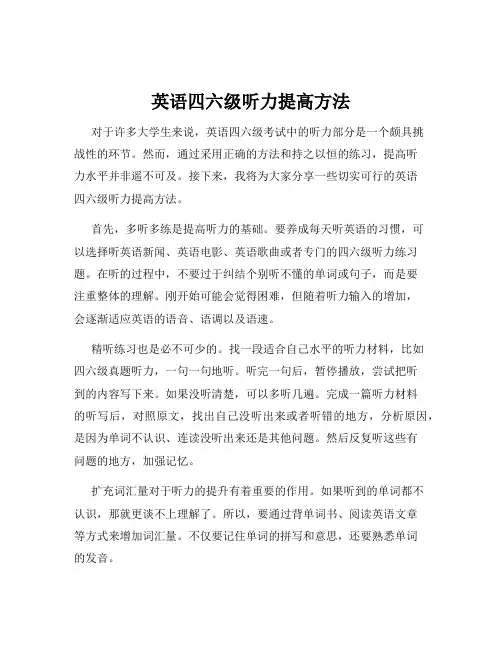
英语四六级听力提高方法对于许多大学生来说,英语四六级考试中的听力部分是一个颇具挑战性的环节。
然而,通过采用正确的方法和持之以恒的练习,提高听力水平并非遥不可及。
接下来,我将为大家分享一些切实可行的英语四六级听力提高方法。
首先,多听多练是提高听力的基础。
要养成每天听英语的习惯,可以选择听英语新闻、英语电影、英语歌曲或者专门的四六级听力练习题。
在听的过程中,不要过于纠结个别听不懂的单词或句子,而是要注重整体的理解。
刚开始可能会觉得困难,但随着听力输入的增加,会逐渐适应英语的语音、语调以及语速。
精听练习也是必不可少的。
找一段适合自己水平的听力材料,比如四六级真题听力,一句一句地听。
听完一句后,暂停播放,尝试把听到的内容写下来。
如果没听清楚,可以多听几遍。
完成一篇听力材料的听写后,对照原文,找出自己没听出来或者听错的地方,分析原因,是因为单词不认识、连读没听出来还是其他问题。
然后反复听这些有问题的地方,加强记忆。
扩充词汇量对于听力的提升有着重要的作用。
如果听到的单词都不认识,那就更谈不上理解了。
所以,要通过背单词书、阅读英语文章等方式来增加词汇量。
不仅要记住单词的拼写和意思,还要熟悉单词的发音。
熟悉英语的语音语调也是提高听力的关键。
英语中的连读、弱读、重读等现象常常会让初学者感到困惑。
例如,“an apple”连读时听起来像“a napple”。
通过学习语音知识,并多听多模仿,能够更好地适应这些语音现象,从而提高听力理解能力。
在练习听力时,可以尝试不同的听力题型和题材。
四六级听力包括长对话、短文理解和听力篇章等题型,涉及到校园生活、社会热点、科技文化等多个领域。
熟悉各种题型的特点和解题技巧,拓宽自己的知识面,有助于在考试中应对自如。
另外,创造英语语言环境也能有效提高听力。
可以参加英语角,和同学用英语交流;也可以在日常生活中,把手机、电脑等设备的语言设置成英语。
这样在潜移默化中增加了英语的输入,提高对英语的敏感度。
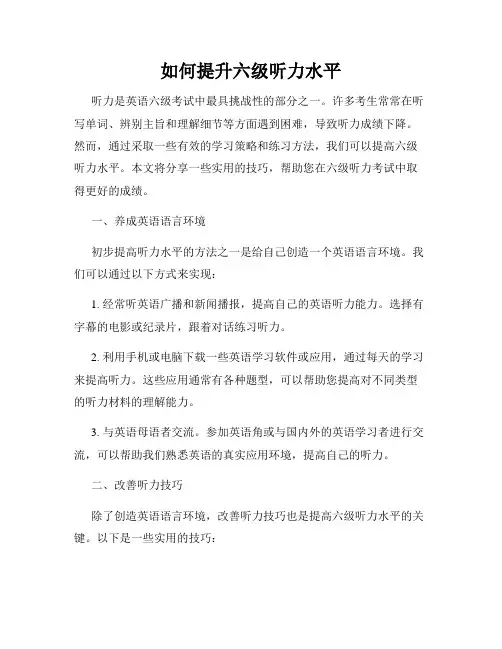
如何提升六级听力水平听力是英语六级考试中最具挑战性的部分之一。
许多考生常常在听写单词、辨别主旨和理解细节等方面遇到困难,导致听力成绩下降。
然而,通过采取一些有效的学习策略和练习方法,我们可以提高六级听力水平。
本文将分享一些实用的技巧,帮助您在六级听力考试中取得更好的成绩。
一、养成英语语言环境初步提高听力水平的方法之一是给自己创造一个英语语言环境。
我们可以通过以下方式来实现:1. 经常听英语广播和新闻播报,提高自己的英语听力能力。
选择有字幕的电影或纪录片,跟着对话练习听力。
2. 利用手机或电脑下载一些英语学习软件或应用,通过每天的学习来提高听力。
这些应用通常有各种题型,可以帮助您提高对不同类型的听力材料的理解能力。
3. 与英语母语者交流。
参加英语角或与国内外的英语学习者进行交流,可以帮助我们熟悉英语的真实应用环境,提高自己的听力。
二、改善听力技巧除了创造英语语言环境,改善听力技巧也是提高六级听力水平的关键。
以下是一些实用的技巧:1. 预测答案:在听力材料开始之前,快速浏览题目,并预测可能的答案。
这样可以帮助我们更好地理解听力材料的重点和关键信息。
2. 注意时间分配:听力试卷通常要求在有限的时间内完成,所以在听力过程中,我们需要合理地安排时间,将注意力集中在每道题目上,尽量避免错过重要信息。
3. 练习听力原声:为了提高对不同口音和语速的理解能力,我们可以经常用原声材料进行听力练习。
这有助于我们适应真实的听力考试环境。
4. 注意细节:仔细关注听力材料中的细节信息,并将其与选项进行对比。
了解关键词和定位词的含义,有助于我们准确抓住听力材料的重点。
5. 利用暂停功能:在一些在线听力练习平台上,我们可以使用暂停功能,以便更好地处理听力材料。
可以在听力过程中适当地暂停,记录或思考答案,并用手写在试卷上。
三、多样化练习练习是提高六级听力水平不可或缺的一步。
以下是一些多样化的练习方法:1. 听广播和播客:通过收听英文广播和播客,我们可以接触到不同主题和不同说话者的声音,提高自己对不同类型的听力材料的理解能力。
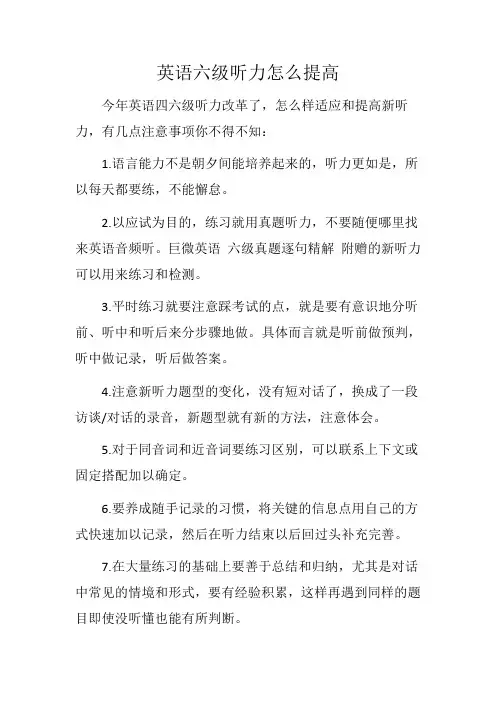
英语六级听力怎么提高
今年英语四六级听力改革了,怎么样适应和提高新听力,有几点注意事项你不得不知:
1.语言能力不是朝夕间能培养起来的,听力更如是,所以每天都要练,不能懈怠。
2.以应试为目的,练习就用真题听力,不要随便哪里找来英语音频听。
巨微英语六级真题逐句精解附赠的新听力可以用来练习和检测。
3.平时练习就要注意踩考试的点,就是要有意识地分听前、听中和听后来分步骤地做。
具体而言就是听前做预判,听中做记录,听后做答案。
4.注意新听力题型的变化,没有短对话了,换成了一段访谈/对话的录音,新题型就有新的方法,注意体会。
5.对于同音词和近音词要练习区别,可以联系上下文或固定搭配加以确定。
6.要养成随手记录的习惯,将关键的信息点用自己的方式快速加以记录,然后在听力结束以后回过头补充完善。
7.在大量练习的基础上要善于总结和归纳,尤其是对话中常见的情境和形式,要有经验积累,这样再遇到同样的题目即使没听懂也能有所判断。
8.时刻谨记听力不只是听听而已,要以做题为最终目的。
所以每次练习要在做题中听,而不是只听不做。
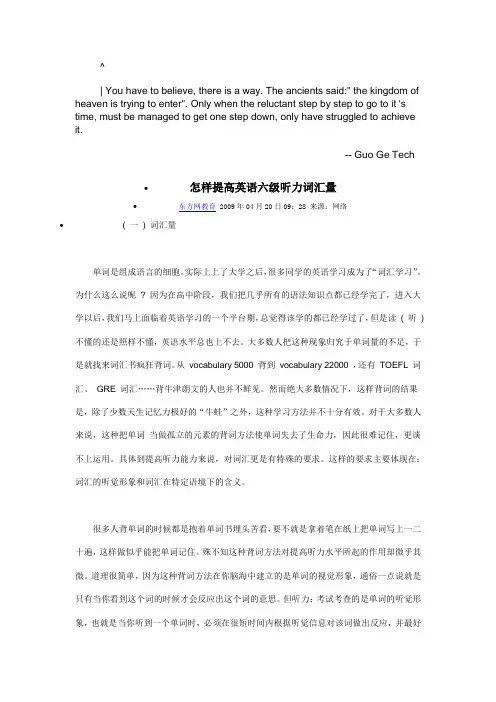
^| You have to believe, there is a way. The ancients said:" the kingdom of heaven is trying to enter". Only when the reluctant step by step to go to it 's time, must be managed to get one step down, only have struggled to achieve it.-- Guo Ge Tech∙怎样提高英语六级听力词汇量∙东方网教育 2009年04月20日09:28 来源:网络∙( 一) 词汇量单词是组成语言的细胞。
实际上上了大学之后,很多同学的英语学习成为了“词汇学习”。
为什么这么说呢? 因为在高中阶段,我们把几乎所有的语法知识点都已经学完了,进入大学以后,我们马上面临着英语学习的一个平台期,总觉得该学的都已经学过了,但是读( 听) 不懂的还是照样不懂,英语水平总也上不去。
大多数人把这种现象归究于单词量的不足,于是就找来词汇书疯狂背词。
从vocabulary 5000 背到vocabulary 22000 ,还有TOEFL 词汇、GRE 词汇……背牛津朗文的人也并不鲜见。
然而绝大多数情况下,这样背词的结果是,除了少数天生记忆力极好的“牛蛙”之外,这种学习方法并不十分有效。
对于大多数人来说,这种把单词当做孤立的元素的背词方法使单词失去了生命力,因此很难记住,更谈不上运用。
具体到提高听力能力来说,对词汇更是有特殊的要求。
这样的要求主要体现在:词汇的听觉形象和词汇在特定语境下的含义。
很多人背单词的时候都是抱着单词书埋头苦看,要不就是拿着笔在纸上把单词写上一二十遍,这样做似乎能把单词记住。
殊不知这种背词方法对提高听力水平所起的作用却微乎其微。
道理很简单,因为这种背词方法在你脑海中建立的是单词的视觉形象,通俗一点说就是只有当你看到这个词的时候才会反应出这个词的意思。
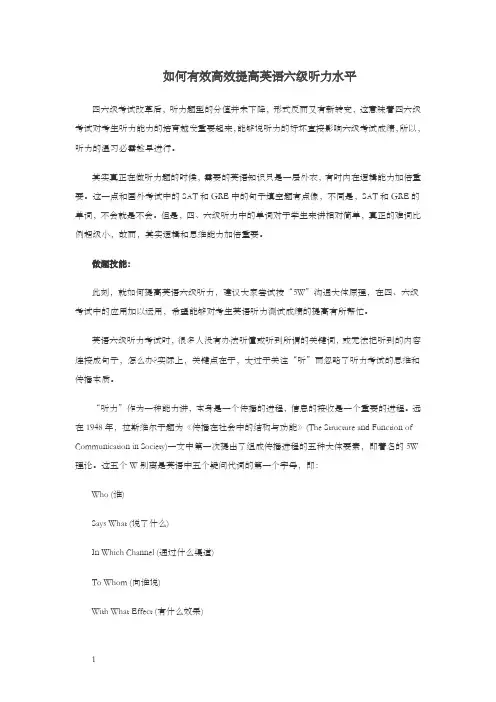
如何有效高效提高英语六级听力水平四六级考试改革后,听力题型的分值并未下降,形式反而又有新转变,这意味着四六级考试对考生听力能力的培育越发重要起来,能够说听力的好坏直接影响六级考试成绩,所以,听力的温习必需趁早进行。
其实真正在做听力题的时候,需要的英语知识只是一层外衣,有时内在逻辑能力加倍重要。
这一点和国外考试中的SAT和GRE中的句子填空题有点像,不同是,SAT和GRE的单词,不会就是不会。
但是,四、六级听力中的单词对于学生来讲相对简单,真正的难词比例超级小,故而,其实逻辑和思维能力加倍重要。
做题技能:此刻,就如何提高英语六级听力,建议大家尝试按“5W”沟通大体原理,在四、六级考试中的应用加以运用,希望能够对考生英语听力测试成绩的提高有所帮忙。
英语六级听力考试时,很多人没有办法听懂或听到所谓的关键词,或无法把听到的内容连接成句子,怎么办?实际上,关键点在于,太过于关注“听”而忽略了听力考试的思维和传播本质。
“听力”作为一种能力讲,本身是一个传播的进程,信息的接收是一个重要的进程。
远在1948年,拉斯维尔于题为《传播在社会中的结构与功能》(The Structure and Function of Communication in Society)一文中第一次提出了组成传播进程的五种大体要素,即着名的5W 理论。
这五个W别离是英语中五个疑问代词的第一个字母,即:Who (谁)Says What (说了什么)In Which Channel (通过什么渠道)To Whom (向谁说)With What Effect (有什么效果)听力的进程也是传播的进程,这就意味着,在听的进程,咱们也需要如此的“思维经历”。
实际上,在听的进程完全能够遵循那个脉络,从who入手,说话人中,重要的说话信息一般在第二说话人中,他说了什么,是咱们做题的重点,即所谓的关键词。
通过的途径一般有两种,conversation与paragraph,to whom 就是咱们自己,而效果的考核就是咱们题目。
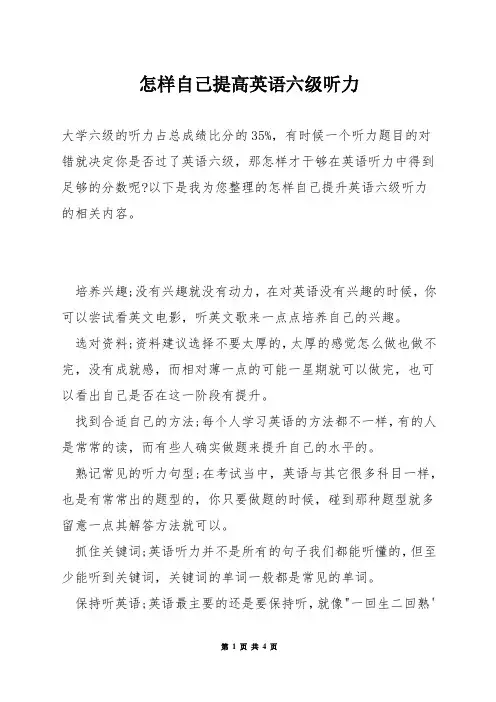
怎样自己提高英语六级听力大学六级的听力占总成绩比分的35%,有时候一个听力题目的对错就决定你是否过了英语六级,那怎样才干够在英语听力中得到足够的分数呢?以下是我为您整理的怎样自己提升英语六级听力的相关内容。
培养兴趣;没有兴趣就没有动力,在对英语没有兴趣的时候,你可以尝试看英文电影,听英文歌来一点点培养自己的兴趣。
选对资料;资料建议选择不要太厚的,太厚的感觉怎么做也做不完,没有成就感,而相对薄一点的可能一星期就可以做完,也可以看出自己是否在这一阶段有提升。
找到合适自己的方法;每个人学习英语的方法都不一样,有的人是常常的读,而有些人确实做题来提升自己的水平的。
熟记常见的听力句型;在考试当中,英语与其它很多科目一样,也是有常常出的题型的,你只要做题的时候,碰到那种题型就多留意一点其解答方法就可以。
抓住关键词;英语听力并不是所有的句子我们都能听懂的,但至少能听到关键词,关键词的单词一般都是常见的单词。
保持听英语;英语最主要的还是要保持听,就像"一回生二回熟'一样,天天的保持就会换来对听力的熟悉。
一天不能听太长时间;时间一长就会对听力产生反感,应该控制在一到两个小时内较好。
2六级英语听力攻略多听。
这是必须要做的事情,不可能你没怎么听然后还想在考试的时候能听得很明白,只有自己平常多听,才干在考试中听的更明白。
多听也有很多的技巧,接下来我就为大家分享一下。
先把每年的真题听力都听最少一遍以上,听力要安时间,听完之后然后批改一下自己听的答案。
针对挺错了的题目再听一遍,然后再批改一下自己的答案。
这两遍都不要去看正确的答案。
听力的第三遍就去对着后面的真题听力解析,把每一题都认真的读一遍,然后分析为什么自己会听错。
就这样,你把每套真题听力都安以上步骤认真的听,认真的完成,英语听力一定会有所提升的。
3英语六级听力怎么提升阅读与听力同时进行学习,词汇量和语法是阅读的关键,阅读量以及阅读能力的好坏,也决定了听说能力的凹凸。
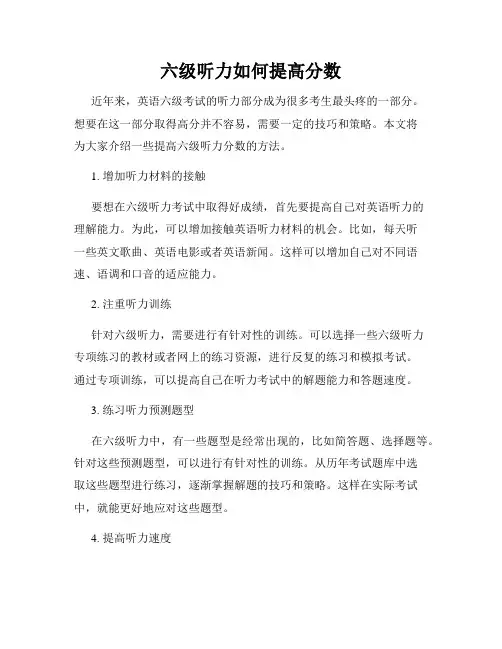
六级听力如何提高分数近年来,英语六级考试的听力部分成为很多考生最头疼的一部分。
想要在这一部分取得高分并不容易,需要一定的技巧和策略。
本文将为大家介绍一些提高六级听力分数的方法。
1. 增加听力材料的接触要想在六级听力考试中取得好成绩,首先要提高自己对英语听力的理解能力。
为此,可以增加接触英语听力材料的机会。
比如,每天听一些英文歌曲、英语电影或者英语新闻。
这样可以增加自己对不同语速、语调和口音的适应能力。
2. 注重听力训练针对六级听力,需要进行有针对性的训练。
可以选择一些六级听力专项练习的教材或者网上的练习资源,进行反复的练习和模拟考试。
通过专项训练,可以提高自己在听力考试中的解题能力和答题速度。
3. 练习听力预测题型在六级听力中,有一些题型是经常出现的,比如简答题、选择题等。
针对这些预测题型,可以进行有针对性的训练。
从历年考试题库中选取这些题型进行练习,逐渐掌握解题的技巧和策略。
这样在实际考试中,就能更好地应对这些题型。
4. 提高听力速度六级听力的难点之一是听力速度较快,需要考生在短时间内准确理解听到的内容。
为此,可以通过听写来提高自己的听力速度。
选择一段较长的英语录音,尽可能快地听写下来,并与原文进行对比,找出自己的错误。
通过反复练习,可以逐渐提高自己的听力速度和准确性。
5. 学会利用上下文和提示词在六级听力中,有些题目的答案可能并没有直接出现在录音中,需要考生通过对上下文和提示词的分析来推断答案。
因此,要学会在听力过程中抓住关键词、提示词,并结合上下文进行判断。
这需要考生在平时的学习中注重阅读和积累词汇。
6. 注意听力技巧在六级听力中,有些题目需要考生注意一些细节或者特殊的表达方式。
比如,数字、时间、地点等信息。
在做题时,要注意听到这些信息并及时记录下来,以免遗漏。
此外,还要注意掌握一些听力的标志词,比如however、in addition等,这些词往往可以帮助考生更好地理解听力内容。
总结而言,要想在六级听力考试中取得高分,需要注重平时的积累和训练。
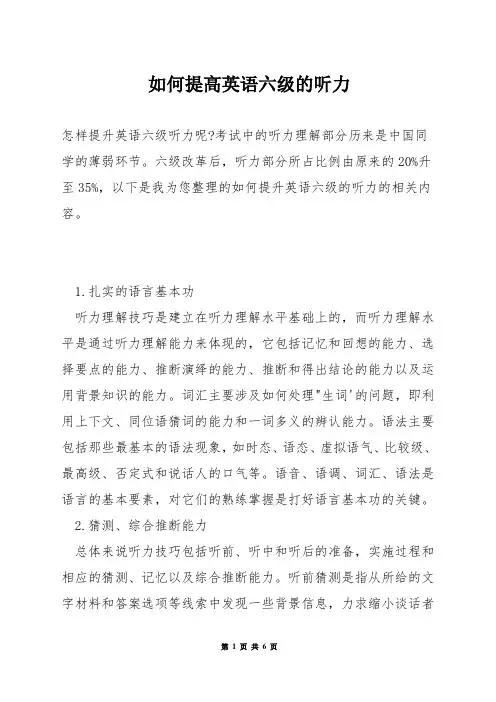
如何提高英语六级的听力怎样提升英语六级听力呢?考试中的听力理解部分历来是中国同学的薄弱环节。
六级改革后,听力部分所占比例由原来的20%升至35%,以下是我为您整理的如何提升英语六级的听力的相关内容。
1.扎实的语言基本功听力理解技巧是建立在听力理解水平基础上的,而听力理解水平是通过听力理解能力来体现的,它包括记忆和回想的能力、选择要点的能力、推断演绎的能力、推断和得出结论的能力以及运用背景知识的能力。
词汇主要涉及如何处理"生词'的问题,即利用上下文、同位语猜词的能力和一词多义的辨认能力。
语法主要包括那些最基本的语法现象,如时态、语态、虚拟语气、比较级、最高级、否定式和说话人的口气等。
语音、语调、词汇、语法是语言的基本要素,对它们的熟练掌握是打好语言基本功的关键。
2.猜测、综合推断能力总体来说听力技巧包括听前、听中和听后的准备,实施过程和相应的猜测、记忆以及综合推断能力。
听前猜测是指从所给的文字材料和答案选项等线索中发现一些背景信息,力求缩小谈话者的话题,它能帮助考生搞清所听内容的类型和结构甚至主题。
考生听的时候可避免过分注重每个单词从而影响对全篇中心思想的理解。
考生应抢时间阅读试卷上的选项,争取主动,以便在听音时有针对性。
听前猜测有一定的客观依据,即话题所使用的词语的范围,这种内容越具体范围就越窄。
不管什么人说话都有一定的逻辑性,这种逻辑性又具有共性,受过一定教育的人是可以把握的。
也就是说通过阅读选项我们可以推测听力材料可能涉及到什么题材和它的内容。
听的过程中要强化记忆,对所听的内容进行联想,并对所听到的内容进行适当的加工,对整体和细节不可偏废。
重视整体的题目是询问对话或短文的中心思想,因此千万要有整体概念,不要只记细节而忽视整体。
听完后必须对所听到的内容进行分析、综合、推理、推断,挑选和问题有关的信息,放弃无用的。
3.有关学科及社会背景知识语言是人们进行交际的手段,社会生活的变化、科技的普及发展、一国的文化历史传统、生活方式、地理气候环境以及人们的思维方式都要反映到语言之中。
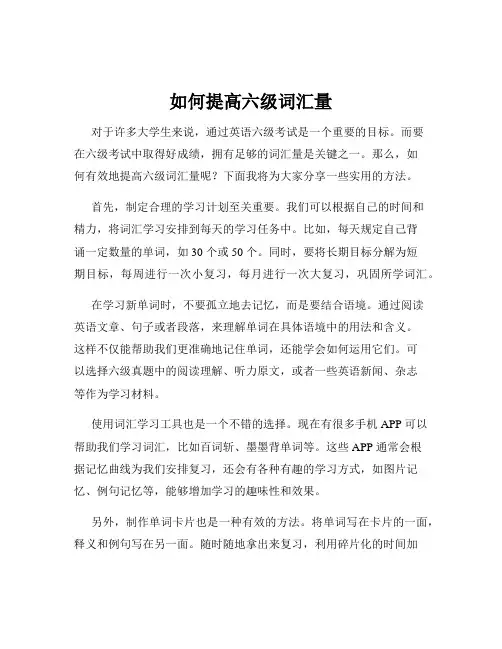
如何提高六级词汇量对于许多大学生来说,通过英语六级考试是一个重要的目标。
而要在六级考试中取得好成绩,拥有足够的词汇量是关键之一。
那么,如何有效地提高六级词汇量呢?下面我将为大家分享一些实用的方法。
首先,制定合理的学习计划至关重要。
我们可以根据自己的时间和精力,将词汇学习安排到每天的学习任务中。
比如,每天规定自己背诵一定数量的单词,如 30 个或 50 个。
同时,要将长期目标分解为短期目标,每周进行一次小复习,每月进行一次大复习,巩固所学词汇。
在学习新单词时,不要孤立地去记忆,而是要结合语境。
通过阅读英语文章、句子或者段落,来理解单词在具体语境中的用法和含义。
这样不仅能帮助我们更准确地记住单词,还能学会如何运用它们。
可以选择六级真题中的阅读理解、听力原文,或者一些英语新闻、杂志等作为学习材料。
使用词汇学习工具也是一个不错的选择。
现在有很多手机 APP 可以帮助我们学习词汇,比如百词斩、墨墨背单词等。
这些 APP 通常会根据记忆曲线为我们安排复习,还会有各种有趣的学习方式,如图片记忆、例句记忆等,能够增加学习的趣味性和效果。
另外,制作单词卡片也是一种有效的方法。
将单词写在卡片的一面,释义和例句写在另一面。
随时随地拿出来复习,利用碎片化的时间加深记忆。
可以在卡片上标注自己对这个单词的掌握程度,比如“熟悉”“模糊”“陌生”,以便更有针对性地进行复习。
同时,不要忘记通过练习来巩固词汇。
做一些与词汇相关的练习题,如填空、选择、翻译等,能够检验自己对单词的理解和掌握程度。
还可以尝试用所学单词进行写作练习,这样既能锻炼词汇运用能力,又能提高写作水平。
观看英语电影、电视剧或者听英语歌曲也是一种轻松的学习方式。
在欣赏的过程中,留意其中出现的生词,结合剧情或歌词来理解它们的意思。
这不仅能增加学习的乐趣,还能让我们接触到真实的语言环境。
此外,参加英语学习小组或者找一个学习伙伴也是很有帮助的。
大家可以互相监督、互相提问、互相交流学习心得和方法。
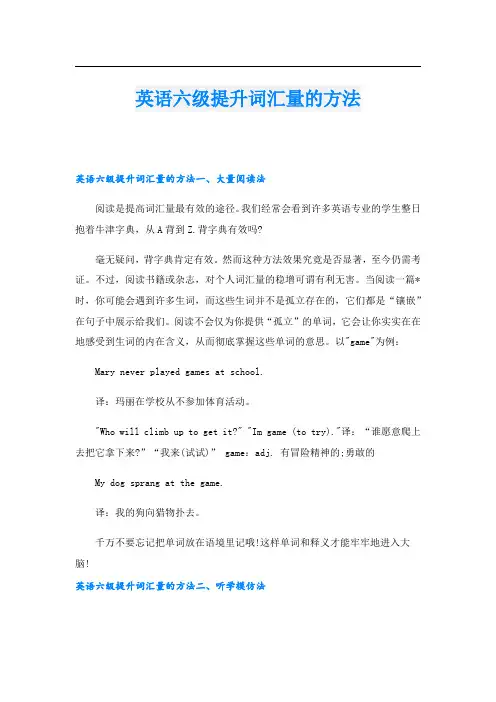
英语六级提升词汇量的方法英语六级提升词汇量的方法一、大量阅读法阅读是提高词汇量最有效的途径。
我们经常会看到许多英语专业的学生整日抱着牛津字典,从A背到Z.背字典有效吗?毫无疑问,背字典肯定有效。
然而这种方法效果究竟是否显著,至今仍需考证。
不过,阅读书籍或杂志,对个人词汇量的稳增可谓有利无害。
当阅读一篇*时,你可能会遇到许多生词,而这些生词并不是孤立存在的,它们都是“镶嵌”在句子中展示给我们。
阅读不会仅为你提供“孤立”的单词,它会让你实实在在地感受到生词的内在含义,从而彻底掌握这些单词的意思。
以"game"为例:Mary never played games at school.译:玛丽在学校从不参加体育活动。
"Who will climb up to get it?" "Im game (to try)."译:“谁愿意爬上去把它拿下来?”“我来(试试)” game:adj. 有冒险精神的;勇敢的My dog sprang at the game.译:我的狗向猎物扑去。
千万不要忘记把单词放在语境里记哦!这样单词和释义才能牢牢地进入大脑!英语六级提升词汇量的方法二、听学模仿法通过与人交谈学习新词汇。
大家可以想想,2-3岁的孩子是怎样学习语言的。
当然,听学的方法是否有效还取决于你是在和谁交谈。
请与那些接受过良好教育的牛人为伍吧!此外,观看有趣的演讲,在学校里尝试着上等级稍高的外语课程也是不错的选择。
英语六级提升词汇量的方法三、速写记忆法阅读和听力使你接触新鲜词汇。
一旦有人使用了你不熟悉的单词,或是阅读过程中,你遇到新词,请迅速记下来。
英语六级提升词汇量的方法四、查词联想法每当你听到或读到新词,你应该试着通过上下文来猜测单词的意思。
记下单词的读音同样非常重要,这里,只需要用你自己熟悉的方式记录就可以。
比如,"unique",你可以将它的发音写成"U-nik",只要自己看得懂就ok.何况,目前在线字典均配有单词发音,点击单词旁边的小喇叭,大声跟读几遍,直到会读为止。
如何提高英语六级听力都说英语六级很难,那么六级到底难在哪里呢?不仅是是六级对于词汇和语法的要求比四级高很多,更是因为六级的听力很难。
想顺利考过六级就必须要解决听力,下面就具体说一说该如何提高英语六级听力。
1.精听听力:很多人在听英语听力的时候,都是很泛的听一下,然后就不管了。
这样听听力是完全没有效果的,大家必须认认真真的精听听力。
对于一篇听力要反复的听,听不懂就看原文,然后继续听,直到自己能够完全听懂为止。
另外大家不仅要做到精听,还需要多听。
只要听的多了,英语“语感”自然就有了,这对于做听力题很有帮助。
2.朗读文章:很多人上大学之后,都没有朗读过英文文章。
很多人都感觉朗读文章没啥用,这是一个学习的误区。
朗读文章能够很好的校正大家的单词读音,而且对于语感的提升很有帮助。
另外,也有助于大家对英文文章思维的理解。
3.试题演练:提高英语六级听力,就必须进行试题的练习。
对于往年真题的练习是不能少的,大家可以通过往年的真题锻炼做题能力,而且还能对试题的出题方向进行把握。
虽然六级听力改革了,但只是改了一部分,并不影响真题的作用。
巨微英语——六级真题/逐句精解在这方面就做的很好,这本书把短对话和复合式听写这两个旧题型都删掉了,很人性化,适合基础不好的同学来练习。
另外大家还需要对于新加的讲座听力进行练习,巨微英语就有新题型的试题,大家可以直接进行练习。
大家在练习的时候,务必要掌握新题型的特点。
4.掌握技巧:做题技巧对于提高做题速度,提升做题的正确率很有帮助。
巨微英语就专门总结有很多的英语听力的做题技巧,这些技巧非常实用,很赞!大家对于这些技巧要好好的学习掌握。
5.注意心态:英语听力不是一个可以突击学好的题型,而是需要大家长期的学习。
而且听力的学习是比较枯燥和无聊的,需要大家去不断的坚持。
听力的知识是需要大家去不断的积累,只要积累的时间足够长,大家自然就能够学好听力。
一定要努力和坚持!希望这些建议对大家有帮助,并祝愿大家都能够考好。
六级听力的提升方法六级听力考试是许多考生的痛点,因为这一部分所占的分数较大,而且长篇听力对于非英语专业的学生来说常常难以理解。
然而,只要选择正确的学习方法和坚持练习,您就能够有效地提高六级听力水平。
本文将介绍一些提升六级听力的有效方法。
1. 提前准备在参加六级听力考试之前,提前准备是非常重要的。
首先,建议你通过听英语广播、英语电影和纪录片来培养对英语语音的熟悉度。
此外,可以尝试参加英语角、英语口语俱乐部等活动,提高自己的英语听力和口语能力。
2. 注意听力材料在听英语材料时,要注意选择合适的听力材料。
六级听力考试通常涉及各种主题,包括学术、日常生活和社会文化等。
因此,在准备阶段,要选择多样化的听力材料,以便熟悉不同主题和不同语境下的英语表达。
3. 多听多练六级听力考试强调对细节和整体理解的能力,因此多听多练是非常重要的。
可以通过听英语新闻、英语故事或者专门的六级听力练习材料来提高听力技巧。
在这个过程中,要注意提高自己的听力速度和准确性。
4. 重视笔记和关键词在听力过程中,一定要注意做好笔记。
可以根据听到的内容做简单的关键词记录,帮助自己理解整篇听力材料。
同时,要学会辨别主要信息和次要信息,抓住关键词,同时注意听讲者的语气和语调来推测信息的重要性。
5. 预测问题和选项在听力考试的准备阶段,要学会预测问题和选项。
通常,在听前准备时,会先给出问题和选项,因此,在听的过程中,可以按照这些问题和选项有针对性地提前理解一些相关信息。
6. 抓住关键信息六级听力考试通常以短文形式出现,因此要善于抓住关键信息来理解整篇短文的意思。
可以通过强调词汇的发音、重要事件的发展和转折的语气来进行判断和推理。
7. 听力技巧训练提高六级听力水平的最佳方法之一是进行听力技巧训练。
可以通过学习不同的听力技巧,如捕捉关键词和信息、判断说话人的态度和意图等来提高自己的听力能力。
8. 模拟考试最后,要进行模拟考试来测试自己的听力水平。
可以利用六级真题或者在线模拟题来进行自我评估。
[应对六级考试写作词汇量不足的3个方法]六级考试词
汇量
不足是很多考生面临的问题,以下是三种提高词汇量的方法:
1.多读多背:通过阅读大量的英文文章、新闻、杂志等,可以接触到更多的词汇,并且可以在不断的阅读中逐渐熟悉和记忆这些词汇。
同时,背诵一些常用的单词、短语和句子也是一个有效的方法,可以帮助加深对这些词汇的理解和记忆。
2.制定学习计划:制定一个合理的学习计划,包括每天的学习时间和学习内容。
可以选择每天花一定时间学习一些新的词汇,并且将这些新的词汇运用到写作中,加深对词汇的印象和理解。
同时,可以通过创造语境来学习词汇,比如编写词汇卡片、制作词汇表等方式帮助记忆。
3.利用学习工具:利用学习工具来辅助学习,比如使用词汇书、词汇软件、在线词典等。
这些工具可以帮助查找词汇的意思、用法以及提供例句,提高对词汇的掌握和理解。
同时,可以参加一些词汇扩展的课程或线上学习平台,系统地学习和巩固词汇。
通过以上方法的综合使用,可以有针对性地提高词汇量和写作水平。
重要的是保持坚持和积极的学习态度,相信付出会有回报。
如何有效提高英语六级听力能力提高英语听力能力是很多学习者的一个难题,尤其对于准备参加英语六级考试的学生来说,听力部分的得分占比很大。
下面将介绍一些有效的方法,帮助学生提高英语六级听力能力。
一、多听提高英语听力能力最基础的方法就是多听。
每天保持一定的听力训练时间,并在不同的听力材料上进行练习。
可以选择英语新闻、英语电台节目、英语电视剧等进行听力练习。
同时,可以通过使用英语学习APP,如网易有道、扇贝等,进行听力练习。
二、多样化听力材料选择除了常规的英语听力材料外,学生们也可以尝试其他多样化的选择。
例如,可以下载一些英语听力讲座音频,像TED演讲、Podcasts等,这些讲座丰富了学生们的词汇量,而且听力材料的难度也相对较高,有助于拓宽学生的听力范围。
三、做好听力笔记对于每一段听力材料,学生在听的过程中可以尝试做好听力笔记。
这不仅有助于学生聚焦注意力,提高听力的集中力,还能帮助学生记录重要的信息,便于日后复习回顾。
听力笔记应该简洁明了,包括关键词、名词、数字等。
四、模拟考试模拟考试能够帮助学生熟悉考试的形式和时间限制,并发现自己在听力部分的不足之处。
可以使用市面上的英语六级模拟试卷来进行练习,将自己置身于真实的考试环境中,找出自己的薄弱点,有针对性地进行训练和提高。
五、集中注意力在进行英语听力训练时,学生们需要集中注意力,保持专注。
可以通过创造一个安静的学习环境、戴上耳机、做好心理调整等方式来提高听力的专注度。
在学习过程中要尽量排除干扰因素,全身心地投入到听力训练中。
六、提高词汇量及语法理解能力英语六级听力考试中,词汇量和语法理解能力都是重要的依据。
学生们应该通过积累词汇、学习常用的动词短语、理解常见的语法结构等方式来提高自己的词汇量和语法理解能力。
这样有助于学生在听到生词和复杂的句子时能更好地理解和抓住重点。
七、反复听反复听是提高英语听力能力的有效方法之一。
在进行听力训练时,可以多次听同一段材料,帮助巩固对关键词的理解以及整体理解。
怎样提高英语六级听力如何提升四六级听力,关于同学而言,四六级是一个难关,尤其是关于英语不好的同学来说,简直就是难于登天,而听力是其中比较重要的一个内容,那么如何提升四六级听力呢?以下是我为您整理的怎样提升英语六级听力的相关内容。
1、学会抓关键词在听力过程中,我们要学会抓其中的关键词。
在语段之间的停顿时间,快速浏览选项,对比其不同之处,在听的过程中通过关键词推断说话者的身份,帮助自己搜索相关背景知识。
2、学会划分意群很多人在听的时候都是逐个单词地听,想要听懂每一个单词。
其实这样做是没有必要的,也是很难做到的。
因此,我们要学会划分意群来听,分词组分词块来听会帮助你节省很多时间,并能让你更快地理解句子是什么意思。
3、学会提前思索在听力开始之前,你就要浏览完材料,结合选项开始思索。
这段话要讲什么,目的又是什么。
并学会推测,包括对话题的猜测、甚至通过常识进行答案的猜测。
这样才干在考试之中处于主动的位置,所以,听听力要积极主动。
4、学会做笔记好的笔记能够让你的思路清楚,让你了解听力内容的结构。
在听力的开头结尾时就要集中精神,记住相关信息,因为那很有可能就是听力的重点。
有时考点在出题时是按照顺序来出的,因此笔记能帮助我们排除一些干扰选项。
5、学会注意数字要注意以下几方面:常规数字的连读,百分数,分数,小数,百分比,号码,航班号,驾照号,信用卡号等等。
2怎样才干提升大学六级听力培养兴趣;没有兴趣就没有动力,在对英语没有兴趣的时候,你可以尝试看英文电影,听英文歌来一点点培养自己的兴趣选对资料;资料建议选择不要太厚的,太厚的感觉怎么做也做不完,没有成就感,而相对薄一点的可能一星期就可以做完,也可以看出自己是否在这一阶段有提升找到合适自己的方法;每个人学习英语的方法都不一样,有的人是常常的读,而有些人确实做题来提升自己的水平的熟记常见的听力句型;在考试当中,英语与其它很多科目一样,也是有常常出的题型的,你只要做题的时候,碰到那种题型就多留意一点其解答方法就可以抓住关键词;英语听力并不是所有的句子我们都能听懂的,但至少能听到关键词,关键词的单词一般都是常见的单词保持听英语;英语最主要的还是要保持听,就像"一回生二回熟'一样,天天的保持就会换来对听力的熟悉一天不能听太长时间;时间一长就会对听力产生反感,应该控制在一到两个小时内较好。
如何提高英语六级听力如何提高英语六级听力?马上又要考六级了,大家复习的怎么样呢?是胸有成竹还是以消极的心态应对六级?今天就来给大家讲讲如何提高英语六级听力。
下面这些问题针对如何提高六级听力给出了完美的解答方案。
一、怎样培养良好的听力语感?提高听力水平没有捷径可走。
要想听力提高还是要多练习,平时做完题后对照着听力原文多听几遍,听不懂的词汇反复听,长期坚持就一定会有所提高。
可以登录网站“零元课”,下载免费的历年听力音频文件,对照着字幕跟读。
只有对这些单词的读音熟悉了,听的时候才能迅速反应出单词意思。
二、六级听力改革后题型是什么?对比改革前和改革后的六级听力题型,可以得知:1、听力在六级试卷中的占比不变,仍为35%;2、取消了8个短对话和复合式听写;3、保留原有的2篇长对话,但题目设置由原先的7题升至8题(每篇文章4题);4、将原有的3篇短文降至2篇;5、新增3篇讲座听力,前两篇各3题,后一篇4题。
针对六级听力的题型改革,大家可以用巨微英语《六级真题/逐句精解》的“听力模拟特训”部分演练听力新题型,提前对改革后新题型有一个深入的了解。
三、新增讲座/讲话听力有什么解题技巧?新增的讲座听力涉猎内容广泛,学术性较强,语言的使用较为规范,这无疑会增加这部分的听力难度。
好在这部分题型固定,大家可以看看巨微英语“六级真题/逐句精解”中那本“听力满分兵法大总结”,这本小册子针对不同的题型讲解了不同的解题技巧,并且说明了听的时候要注意的重点。
就题型来说:第一种是细节题,这种题型只需要把听音时记录的信息与选项信息匹配即可。
第二种是推断题,这种题型较难,因为选项把原文内容换了一种表述形式,在听的时候还要注意它的其他表述方式,比如同义词,句型转换等。
大家要重点关注讲座中主要人物和主要事件的起因、经过和结果;现象或问题的发展趋势及其对社会或人们造成的影响。
第三种是主旨题,这种题型非常简单,大家只要注意文章首尾句,这两处都会点明主题。
生活需要游戏,但不能游戏人生;生活需要歌舞,但不需醉生梦死;生活需要艺术,但不能投机取巧;生活需要勇气,但不能鲁莽蛮干;生活需要重复,但不能重蹈覆辙。
-----无名∙怎样提高英语六级听力词汇量∙东方网教育 2009年04月20日09:28 来源:网络∙( 一) 词汇量单词是组成语言的细胞。
实际上上了大学之后,很多同学的英语学习成为了“词汇学习”。
为什么这么说呢? 因为在高中阶段,我们把几乎所有的语法知识点都已经学完了,进入大学以后,我们马上面临着英语学习的一个平台期,总觉得该学的都已经学过了,但是读( 听) 不懂的还是照样不懂,英语水平总也上不去。
大多数人把这种现象归究于单词量的不足,于是就找来词汇书疯狂背词。
从vocabulary 5000 背到vocabulary 22000 ,还有TOEFL 词汇、GRE 词汇……背牛津朗文的人也并不鲜见。
然而绝大多数情况下,这样背词的结果是,除了少数天生记忆力极好的“牛蛙”之外,这种学习方法并不十分有效。
对于大多数人来说,这种把单词当做孤立的元素的背词方法使单词失去了生命力,因此很难记住,更谈不上运用。
具体到提高听力能力来说,对词汇更是有特殊的要求。
这样的要求主要体现在:词汇的听觉形象和词汇在特定语境下的含义。
很多人背单词的时候都是抱着单词书埋头苦看,要不就是拿着笔在纸上把单词写上一二十遍,这样做似乎能把单词记住。
殊不知这种背词方法对提高听力水平所起的作用却微乎其微。
道理很简单,因为这种背词方法在你脑海中建立的是单词的视觉形象,通俗一点说就是只有当你看到这个词的时候才会反应出这个词的意思。
但听力:考试考查的是单词的听觉形象,也就是当你听到一个单词时,必须在很短时间内根据听觉信息对该词做出反应,并最好是以英语思维做出反应( 此点在后面将详细讨论) 。
在这种情况下,那些只建立了视觉形象而没有建立听觉形象的词对你来说,实际上还是完全的生词。
要解决这个问题,就要求我们在背单词的同时注意建立词的听觉形象。
这就要求我们必须在学习新单词的过程中增加朗读这一个环节。
最低的要求是,在你拿着单词书背单词的时候,除了看和写,还要严格根据音标的发音将单词朗读几遍,以此来建立单词的听觉形象。
例如,当你在记"evil" 这个单词时就不能通过它是“live" 四个字母颠倒来记,而是要把记忆的重点放在它的发音[' i:vl ] 上。
另一个方面是单词在特定环境下的语义。
听力考试中所考查的绝大部分是口语式文体,它并不要求严格按照用词规范,还经常涉及到很多的特殊用法,这就要求我们了解和熟悉单词在听力常考的语境下的意思。
例如1996 年1 月份的六级听力考试中有这么一题:M :Where is Joan ?She said she would be here at three .And now it's three thirty .She must have missed the train W :I think so ,but I hope she won't miss the next one .Otherwise ,she should be late for the opening address at the conference .Q :What's the woman worry about?A)Joan may have taken a wrong train .B)Joan won't come to the conference .C)Joan will miss the next conference .D)Joan may be late for the opening speech .正确答案是D 。
在这一题中,根据问题可以看出woman 的话是解题的关键,而她所提到的"opening address" 又是其中的解题点。
对于"address" 这个单词,我们在小学时就已经学过它“地址、住址”这一个意思,我们用的最多的也是这个意思,因此在绝大多数情况下当我们听到"address" 这个词的时候,也会最先反应出它是表示“地址、住址”的意思。
但是在这一句话当中所考查的实际上是它的另一个意思:“演讲”。
如果无法正确反应出这一层意思,我们就无法正确理解整句话。
回到题目,我们会发现其实原文已经提供了一条有助于我们正确理解词义的线索:“at the conference ”。
在与“大会”连用时,“address' '当然应该是表示“演讲”的意思。
这就是根据单词所出现的特定场合判断词义的一个很好的例子。
这一道题中还有另一个值得注意的单词:"miss" ,这也是六级听力中常考的单词。
再看一个例子,这是2000 年1 月份的试题。
M :I ' m sorry I missed the football game 。
but I had a terrible cold .W :You don't miss anything .We couldn't have played Worse .Q :What does the woman mean?A) Footbell is her favorite pastime .B)The game has been canceled .C)Their team played very badly .D)She's never watched a better game .正确答案是C 。
在这一道题中,“miss' '同样出现了两次。
而在两道题的四个"miss" 全是表示“错过、遗漏”的意思,并非我们最初所学的,也是印象最深刻的“思念”的意思。
可见,在准备六级听力的过程中,我们应当注意积累在听力中出现频率较高的那些单词的多层含义以及听力中常考的意思。
六级听力考试所考查的是会话,里面常常涉及到一些口语中经常用到的单词或短语,如果能在考试之前掌握这些单词短语的话,在考场上的发挥一定会觉得更加得心应手。
下面是我所总结的一些较常考的单词或词组:make difference 有不同check out ( 图书馆) 将书借走,( 宾馆) 付账离开for ages 很长时间think much of sb .对( 某人) 评价很高on half way 在半路上behind schedule 落后于预定计划/时间take responsibility for 对……负责take one's place 取代( 某人) 的位置in reserve ( 书) 不借出,留待备用out of condition 健康状况不好in favor of 赞成,支持be qualified 有资格back number ( 杂志) 过期刊物have a hard time in doing sth 费很大力气做某事at one's convenience 在( 某人) 方便的时候on the right track 照着正确的路线运行be(not)in the mood ( 没) 有心思give presentation 就……发言/口头陈述run out of 用完,用尽cut a class 旷一堂课drop by(in) 顺便经过( 某处) 并停留ring up 致电,打电话run away from 回避take your time 不用着急get access to 走进,接近,能够利用某物start with …以……开始hang up 挂电话start off 开始run into 偶然碰见play against 同……比赛break down 出毛病book up 全部预定完come along 到来,出现,发生a part-time job 兼职out of touch with 不接触big bargain 便宜货,大甩卖approve of 赞同build up 树立,增大,增进hold up 支持,支撑,继续下去in a way 在一定程度上,从某方面看equal to 胜任,等于rule out 划去,排除,消除go about 着手做,从事without fail 必定,总是at times 有时,间或to be worn out 被穿破、被用旧turn up 到来,出席keep one ' s mind on 专心于figure out 计算出,领会到建议题型:对话中常有一些表示建议的题目,其卷面特征有些象动作题型,即选项有可能是动词(原形)短语,但有时会以“ing”的形式出现,偶尔也会是完整的句子(句子中往往含有should)。
要注意将建议题型与上述两种其它题型加以区别。
建议题型的提问方式通常有:What does the man/woman suggest the woman/man do?What does the man/woman mean?在对话中的关键特征主要在于表示建议的一些句型,如:Why don't you …?Why not …?Why bother?How about …?Wouldn't … be wiser?Would … do sth.?Why don't you …?与why not …?句型的解题关键在于它们后面的词,这些关键词有时会产生替换,在选项中以其同义词的形式出现。
如:M: Mary, why isn't Jane teaching here this term?W: The movie start in 5 minutes and there's bound to be a long line.M: Why don't we come back for the next show? I'm sure it would be less crowded.Q: What is the man suggesting?A) Coming back for a later show.B) Waiting in q queue.C) Coming back in five minutes.D) Not going to the movie today.男士的建议中用的是the next show,而在选项中用a later show作替换,虽然两者表达形式不同,但含义是一样的。